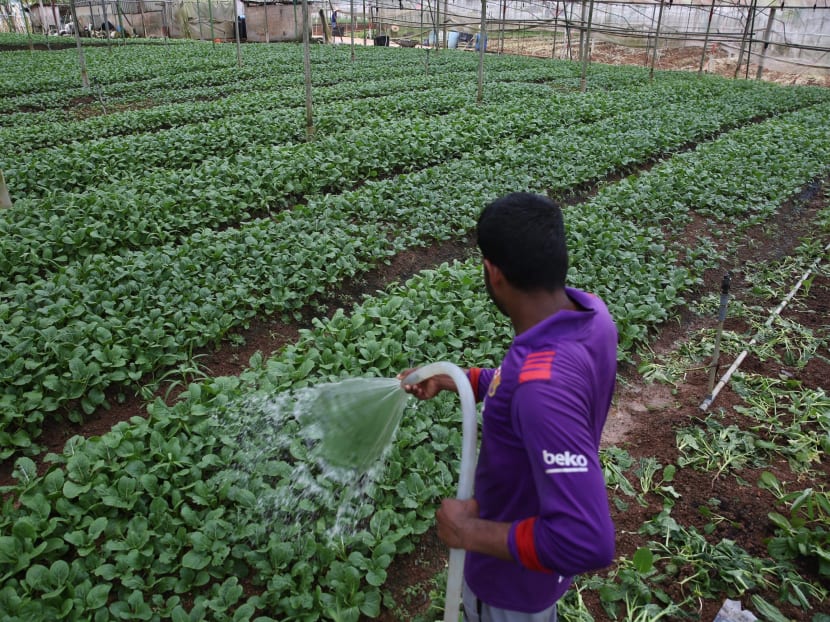390ha of land in Lim Chu Kang to be redeveloped into a high-tech agri-food cluster to support local food production
SINGAPORE — Three-hundred and ninety hectares of land in the Lim Chu Kang area will be redeveloped into a high-tech agri-food cluster over the next few years to ramp up local food production, the Singapore Food Agency (SFA) said on Friday (Oct 2).

The redeveloped Lim Chu Kang area has the potential to produce more than three times its current food production, said SFA in a statement on Friday (Oct 2).
- Development works are expected to start in 2024
- The project is part of the plan to ramp up local food production by 2030
- The redeveloped area can potentially produce more than three times its current food production
SINGAPORE — Three-hundred and ninety hectares of land in the Lim Chu Kang area will be redeveloped into a high-tech agri-food cluster over the next few years to ramp up local food production, the Singapore Food Agency (SFA) said on Friday (Oct 2).
Development works on the 390ha of land are expected to start in 2024 and will be carried out in phases, SFA said in a statement.
The agency added that a master plan of the development works will be done in consultation with stakeholders and will be completed over the next two to three years.
This includes working with local nature groups to conduct an environmental study to better understand the ecosystem of the area which will be taken into consideration in the master plan.
Currently, Singapore imports more than 90 per cent of its food supply, said SFA, which makes Singapore vulnerable to disruptions in the global supply chains.
The aim is for 30 per cent of Singapore’s nutritional needs to be met with locally produced food by 2030, said SFA.
The “30 by 30” goal will ensure that there is a buffer supply of safe and fresh food here, especially for produce such as eggs, fish and leafy vegetables.
In the statement, SFA said all farms in the Lim Chu Kang area will be able to stay until the end of their leases.
Ten food farms and 13 non-food farms, whose leases are expiring between 2020 and 2022, will be offered a short tenancy extension. The land will be redeveloped in line with the masterplan after.
One food farm and two non-food farms whose leases are expiring between 2026 and 2027 will be allowed to continue until their leases expire.
SFA said the agency and the National Parks Board will work closely with these farms to support their transition plans.
In response to TODAY’s queries, SFA said farmers have been regularly advised by agencies to consider their remaining tenancy or lease duration when making business and investment decisions.
Those who wish to continue farming can also bid for new farmland or alternative spaces via upcoming tenders, said the agency. They can also consider indoor spaces.
SFA added that existing farms which are productive and have a good track record, as well as technology and productivity concepts, will stand a higher chance of being awarded the new land parcels.
Farmers which require additional help can get in contact with their account manager at SFA or NParks for assistance.
INCREASING PRODUCTIVITY
SFA said it will also be looking into the development of shared facilities to lower the cost of production and resource use as part of the master plan.
The agency will put in place water, electricity and transport infrastructure to support high-tech farming systems. This will in turn attract a new generation of agri-tech skilled workers, it said.
“This is in response to feedback from the industry and will address pain points that the industry have raised in the past, and provide farms with the necessary infrastructure and support to scale up and boost production,” said SFA.
SFA will also look into how it can conserve the use of resources and minimise waste by adopting circular economy principles.
Currently, an average vegetable farm in Singapore occupies around 2ha of land and produces about 130 tonnes per hectare per year.
In contrast, a high-tech, high productivity vegetable farm has the potential to produce over 1,000 tonnes/ha/year with less than 1ha of land.
On the other hand, an average fish farm in Singapore occupies around 3ha of land and produces about 10 tonnes/ha/year while a high-tech, high-productivity fish farm has the potential to produce about 500 tonnes/ha/year.
The redeveloped Lim Chu Kang area has the potential to produce more than three times its current food production, said SFA.
“The redevelopment of agriculture land in Lim Chu Kang allows us to uplift the local agri-food sector and develop sustainable, highly productive and industry-leading farms of the future,” said SFA.
“This will strengthen our food security and create good, green jobs for Singaporeans.”
FUTURE OF BUSINESS UNCERTAIN
Owners of the farms in the affected areas said the move has left some of them in the lurch and they are now worried about the future of their businesses.
Director of Marugen Koi Farm Johnny Yeo, who said he is among the 23 farm operators who were offered a lease extension, is concerned that he will not have an alternative location to continue his business.
Mr Yeo, whose lease will end later this year, added that pivoting his business to one that is high-tech and centred on food production is also not possible as his business sells ornamental fish and caters to hobbyists.
For Mr Sam Chua, owner of Crab Lovers Farm, alternative parcels of land in Lim Chu Kang have been offered by the authorities, but he is still weighing his options as relocating would mean investing yet another few million dollars with no guarantee that this would be the last time he would have to move.
Mr Chua, whose lease ends in December next year, added that because he only took over the site in 2018, he still has not recouped the initial investment he made into the business.
He is now weighing his options — to relocate, close the business or shift to a freehold shophouse — but said it is unlikely that he will take up the new land in Lim Chu Kang because of the cost.
In response to TODAY’s queries, SFA said ornamental fish companies may consider moving indoors into commercial or industrial spaces, if they are interested in continuing their business beyond the extensions provided.
NParks will be tendering out land for ornamental fish activities in the fourth quarter of 2020, said SFA.
ADDITIONAL REPORTING FROM JUSTIN ONG











